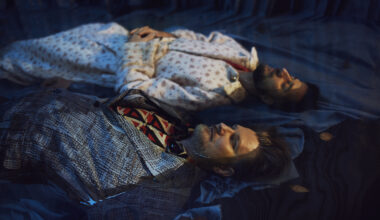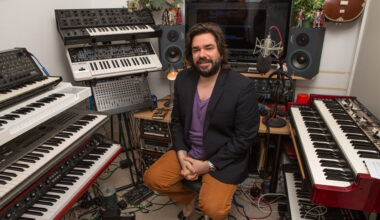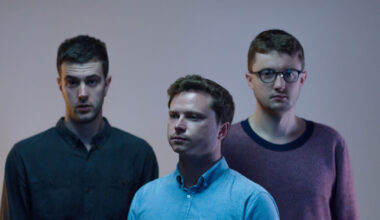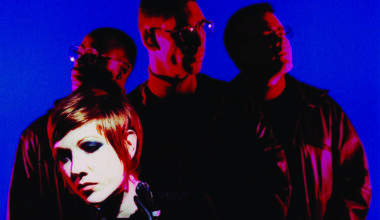Forty years ago, on Friday 18 May 1979, David Bowie released his 13th album, ‘Lodger’, 18 months after its lauded predecessor, ‘Heroes’. ‘Lodger’ was the last of the so-called Berlin Trilogy, but the flat that Bowie occupied with Iggy Pop at 155 Haupstraße in the western half of the walled city had long since been vacated.
Bowie’s stint retreading Christopher Isherwood’s Weimar glory days of ambi-sexual decadence was over.
He’d done Berlin. He’d consorted with the star of the underground cabaret scene, Romy Haag. He’d donned a German helmet and made his Weimer-era movie, ‘Just A Gigolo’, alongside no less a Berlin legend than Marlene Dietrich. He’d finished off one sublime album (‘Low’) and made one more (‘Heroes’), all in the shadow of the Wall.
And then he was gone. In September 1978, Vogue magazine asked him how long he intended to stay in West Berlin. “I think I’ve finished there now,” he replied.
And so ‘Lodger’, mostly recorded in Switzerland towards the end of 1978, was a Berlin album in name only. Bowie was already one of the city’s many celebrated ghosts. The haunting was mutual, Berlin being the central theme to his mournful masterpiece ‘Where Are We Now?’ on 2013’s ‘The Next Day’ album.
Bowie has stalked the fantasy construct of Berlin ever since his time there, rather like the angels in Wim Wenders’ 1987 film, ‘Wings Of Desire’. Wenders wanted to address the city’s musical underground in his ravishing movie, and in the scene where Crime & The City Solution take to the stage to perform ‘Six Bells Chime’ and Simon Bonney’s pained baritone holds the audience in a kind of trance, the parallel with Bowie’s appearance in another seminal Berlin film, ‘Christiane F’, is striking.
In ‘Christiane F’, Ulrich Edel’s cult 1981 movie about a teenager’s descent into sordid heroin addiction soundtracked by her fandom of Bowie, Christiane and her teen junkie pals tear through the dreary subterranean warren of walkways of the Berlin Zoo train station to the strains of ‘Heroes’. It’s an epic moment, an uncanny echo of the hopelessness and distress at the heart of the ultimate Berlin Wall song from the ultimate Berlin Wall album. But Bowie’s own appearance in ‘Christiane F’, performing an icy version of ‘Station To Station’ as Christiane gazes up at him, was a sleight of hand. The scene was actually filmed in New York, where he was performing a residency, and much of the audience footage was shot at an AC/DC concert.
Bowie supercharged Berlin’s magnetic appeal in the psyche of a young generation of agitated post-punk activists. The people that he drew in included Mark Reeder from Manchester. Reeder left his job at a record shop and his network of old school chums, which included Joy Division, and forged a new life in West Berlin, where he became the de facto Factory Records attaché. He promoted and represented bands from the north of England, whose bedsit visions of Berlin bubbled up from a stew of influences, including German electronic music, Harry Palmer films, a morbid fascination with the extreme political ideologies that had destroyed much of Europe 40 years earlier, and the prospect of the Cold War becoming nuclear hot.
But Mark Reeder arrived in Berlin just as Bowie was leaving and ‘Lodger’ bore a title that perhaps best described its creator’s status as a Berlin resident. There was a sense that Bowie had not only left Berlin, he had also lost interest in the triptych. The standout line of ‘Red Money’, the final song on the album, seems to sum it all up: “Project cancelled”.
Bowie later revealed that his Berlin Trilogy accomplice Brian Eno had announced he was also leaving towards the end of the recording of ‘Lodger’. “He said, ‘David, I’m going away for rather a long time…’,” Bowie told Jean Rook of the Daily Express. “I said, ‘You’re not serious’, and he said, ‘Yes I am’, and he left the next day.”
It’s certainly undeniable that the energy of Bowie and Eno’s collaboration had dissipated by the time they tackled ‘Lodger’. They both needed to move on (if you’ll excuse the pun). The pair convened in Switzerland to record an album that had the working title ‘Planned Accidents’ and set about creating an environment where musical accidents would happen. It didn’t always go down well with the seasoned players in the band, the core of whom (Carlos Alomar on guitar, George Murray on bass and Dennis Davis on drums) had been with Bowie since ‘Station To Station’ in 1976.
During one session, Eno put up a blackboard with chords chalked on it and pointed at it as the band played, indicating where they should change chord. The musicians didn’t enjoy that much, rolling their eyes at each other according to producer Tony Visconti. Bowie and Eno had the band swap instruments for ‘Boys Keep Swinging’, but Visconti later overdubbed the bass part that drummer Dennis Davis had struggled through and only Carlos Alomar’s drum part was kept.
Bowie and Eno crafted three songs from the same chord sequences with different instrumentation and tempos (‘Boys Keep Swinging’, ‘Fantastic Voyage’ and an unreleased third track). They were briefly so enthusiastic about this particular ruse that they even considered creating all the songs on the album from the same chords. ‘Move On’ was the result of playing ‘All The Young Dudes’ backwards and band newcomer Adrian Belew was often made to play parts without hearing the tracks beforehand. They didn’t even tell him what key they were in.
Hiring Adrian Belew was a smart move. A large part of the album’s appeal is down to his explosive guitar playing. The American guitar savant had been poached from Frank Zappa’s group, much to Zappa’s irritation. When Bowie took Belew to a restaurant for a clandestine headhunting meeting, he discovered Zappa was already eating there. Zappa immediately twigged what was going on and kept rebuffing Bowie’s charm by saying ‘Fuck you, Captain Tom’ throughout the frosty encounter.
‘Lodger’ wears its eclecticism on its tatty sleeve. It sounds like a collection of one-off ideas, rather than a coherent statement of whatever Bowie and Eno’s musical thinking might have been. It’s a reflection of their shortening attention spans and sees their sense of adventure focused into individual songs, letting the album hang together more by accident than design, true to the original concept of the work.
The record kicks off with ‘Fantastic Voyage’, which recalls the jumpy ‘TVC 15’ from ‘Station To Station’ when it swerves off into the quirky “Don’t want to live with somebody’s depression” section. ‘African Night Flight’ is next and is the first startling change of gear. You can hear the stirrings of Eno’s later work with David Byrne on ‘My Life In The Bush Of Ghosts’. The song was inspired by a visit to Kenya that Bowie made with his son during a break in the post-‘Heroes’ promotional activity. They encountered German pilots for hire who would spend their time between flights drinking prodigiously and, Bowie suggests, lamenting their former lives as pilots of the Nazi Luftwaffe.
One of the album’s highlights is ‘DJ’, which has a dancefloor bassline that mutates into something altogether more disturbed as Belew is encouraged to lose his shit on the fretboard. The chorus repeats the title character’s refrain – “I am a DJ, I am what I play”. “Time flies when you’re having fun…” he intones during the song’s breakdown, but it doesn’t sound like he’s having much fun, just trying to maintain the cult of his popularity. “I got believers!” he shouts. Is Bowie saying that is what he has become? A selector of his own back catalogue? Reduced to a human jukebox?
Elsewhere, ‘Look Back In Anger’ was later a live stalwart for Bowie, allowing him to voice his Scott Walker impression as the band cooks on a high heat. He would revisit this song several times over the years, trying to extract its essence and get it to land with his audience. ‘Repetition’ has the distanced delivery and coolness of post-punk bands like Wire, who were the new kings of the music press in the late 70s, while ‘Red Money’ recalls ‘Fame’ with its sparse arrangement, nagging Alomar guitar figure and cold funk bassline, not to mention the vocal build-ups. Belew’s moaning guitar sounds almost identical to the treatment Eno had applied to the instrument on ‘After The Heat’, his 1978 album with Roedelius and Moebius, specifically the track ‘Broken Head’.
Perhaps the most Berlin track on the album is ‘Yassassin’, although only because it was inspired by Bowie’s time living in what was the Turkish district of the city. Again, it has a strong individual identity, the loping backbeat nodding at the ska revivalism of two-tone and the bass inspired by reggae, but the offbeat heaviness is spliced to a stab at Arabic scales.
In the aftermath of ‘Lodger’, Brian Eno was in New York, his fingers now firmly jammed in the pies of Talking Heads and the no wave scene, but still finding time to work on his seminal talk, ‘The Studio As A Compositional Tool’. RCA meanwhile started re-releasing David Bowie back catalogue, including a 1975 version of 1972’s ‘John, I’m Only Dancing’ and a US compilation album called ‘1980 All Clear’. Bowie also recorded a new version of ‘Space Oddity’ for the ‘The Kenny Everett Video Show’, which became the B-side of the ‘Alabama Song’ single in early 1980.
By September 1979, left to its own devices somewhat, ‘Lodger’ was old news. It suffered in the shadows of ‘Low’ and ‘Heroes’, as well as the new enthusiasms of its creators. This lack of attention was reflected in the mix, which has a peculiar flatness about it, completed as it was by Bowie and Visconti, working without Eno in a small studio. While it might have reflected the era’s sonic zeitgeist of unfussy production, it obscured the experimental pop brightness. “I play it a lot, despite how bad it sounds to me,” Visconti told Uncut magazine in 2011, before he was able to spectacularly reveal the rich soundscape of his 2017 remix of the album included in the ‘A New Career In A New Town’ boxset.
Back in West Berlin, the hole that Bowie’s brief but intense residency left was already being filled. It’s not as if the city lacked a creative core of its own. After all, this was the place where the Zodiak Free Arts Lab had birthed an entire school of electronic music at the end of the 1960s. But a new decade was looming and a new generation of fiercely independent artists was gearing up to redefine Berlin for the 1980s.






